Social
Occupational Safety and Health
We have introduced an occupational safety and health management system (OSHMS), making an effort to take our occupational safety and health to the next stage. By executing a PDCA cycle as a core element of the OSHMS, we will continue to step up the level of the occupational safety and health. Thereby, we prevent occupational accidents along with providing all employees with safe and healthy workplaces.
*1 The occupational safety and health management system (OSHMS) is designed to prevent labor accidents, promote workers’ health and create comfortable workplaces to raise the level of on-site safety and health by setting and implementing a plan-do-check-act cycle, or PDCA cycle, for the voluntary and continuous management of on-site safety and health. Since January 2009, Kawasaki Plant has been certified as a JISHAcompliant OSHMS-certified business site (certification no.: 09-14-9) based on the guidelines set by the Ministry of Health, Labour and Welfare.
Management system
The plant head serves as the occupational safety and health supervisor and appoints an occupational safety and health manager (from among department managers) and an industrial physician, whose roles are defined in our occupational safety and health management rules.
Also, each of the plants has the own occupational safety and health committee composed of the occupational safety and health supervisor, occupational safety and health manager, industrial physician and a representative of the labor union.
The committee meets once a month to discuss and monitor legal issues and works to raise employees’ awareness of the plant’s annual safety and health plan and monthly initiatives.
Safety records
The following figures show Nippon Yakin Kogyo’s safety record. Serious occupational accidents* remained at zero like the previous fiscal year, but our rate of incident victims
requiring leave (frequency rate) and our rate of lost-time accidents (severity rate) worsened compared to FY2024. We will continue to carry out rigorous safety activities to reduce
our overall accident rate.
* Serious occupational accidents refer to fatalities and disabling injuries or illnesses of disability grade 1 to 7.
Frequency rate
Severity rate
Quality
Nippon Yakin Kogyo produces products that meet customer needs and specifications while complying with related laws, regulations and standards. As a method for managing and increasing our product quality, we are committed to establishing, implementing, maintaining and constantly improving our quality management system that meets the requirements determined by JIS Q 9001/ISO 9001 and JIS Q 9100.
Quality policy
Kawasaki Plant is strict with the quality policy and quality assurance activity-related concept. The policy and concept are communicated across the Plant in a manner helping all on-site workers understand the details. The quality policy is intended to have the following attributes:
- Be appropriate for the purpose and situation of the Plant and help it to make progress in a strategic manner
- Provide a framework for the Plant to set the quality targets
- Include a commitment to meeting the requirements applied to the Plant
- Also include a commitment to improving the quality management system on a continual basis
Quality improvement initiatives
Nippon Yakin Kogyo is executing a PDCA cycle as provided for under JIS Q 9001 for the maintenance and improvement of the product quality. Specifically, we make a plan (P) in consideration of risks and opportunities, do (D) things as planned for the achievement of our quality targets, check (C) the improvements made, and then act (A) by reporting the results for review by the management team.
Quality assurance system
We have the Nippon Yakin Kogyo Group Quality Assurance Committee, chaired by a director appointed by the president to continuously improve the Nippon Yakin Kogyo Group’s quality assurance system. This committee is tasked with the following roles:
- Formulate policies on the improvement of the quality assurance system
- Carry out audits at Group companies’ major production bases (once a year in principle)
- Organize a meeting of Group companies’ employees in charge of quality assurance (once a year)
Standardization activities
To ensure that our products are competitive, we are actively carrying out standardization activities, registering our products for standards such as JIS. Major products of ours, including 64 , 254N and 354N , have already been made JIS-compliant.
Human Rights
Companies are required to recognize that they may have direct and/or indirect impacts on human rights through their business activities and take measures to prevent human rights infringements.
To ensure that Nippon Yakin Kogyo respects and protects the human rights of all its employees, we have established a code of conduct and anti harassment regulations to clarify appropriate behavior in the Company. We also established Nippon Yakin Kogyo Group Helpline Rules, which stipulate the internal consulting and reporting systems that must be present to promptly detect and take correct ive action against unfair acts by organizations and individuals within the Group.
In 2020, the Japanese government determined the National Action Plan on Business and Human Rights. Since then, human rights issues, including those in companies’ supply chains, have been attracting considerable attention. Nippon Yakin Kogyo is aware of the importance of addressing these issues and aims to create an even better system than those mandated by these government rules through ongoing discussions at meetings of the Sustainability Strategy Promotion Committee.
Nippon Yakin Kogyo Group Human Rights Policy
To clearly define the Group’s human rights obligations, the Nippon Yakin Kogyo Group Human Rights Policy was established in April 2024. Based on this policy, we will promote the realization of an inclusive society with no human rights violations or discrimination.
Prevention of harassment
Nippon Yakin Kogyo has established rules to prohibit harassment and all other forms of misconduct, including sexual harassment, abuse of power and harassment of pregnant employees and employees taking maternity, paternity, parental or long-term care leave. Workplace harassment undermines personal dignity and integrity. Such unfair acts create a hostile work environment and should never be permitted.
We provide employees with education to prevent harassment and in FY2023, we conducted an online harassment prevention training seminar for all managers. We also provide employees with services providing advice about harassment, including an internal email-based service and a readily accessible external service.
To protect the victims of harassment, we have also set rules to safeguard the privacy of anyone who uses the advisory service and prevent any reprisal against them.
Human rights due diligence
The Group began carrying out human rights due diligence(HRDD) initiatives in FY2024 according to the United Nations Human Rights Council’s Guiding Principles on Business and Human Rights.
■ Management system
The specifics of HRDD initiatives are discussed by our Sustainability Strategy Promotion Committee chaired by the president. Discussions by the Sustainability Strategy Promotion Committee are reported to and supervised by the Board of Directors as necessary.
■ Process for identifying human rights risks
Scope of FY2024 assessment: Domestic Group businesses
Step 1: Human rights risks specific to this industry were identified among human rights incidents that occurred in the last five years, utilizing international criteria and guidelines and external databases.
Step 2: Among the industry-specific human rights risks identified in Step 1, human rights risks that should be prioritized were identified according to the Group’s current situation and the advice of experts. Human rights risks were identified on two axes: severity (the level of physical, psychological and lifestyle impact in the event that the risk occurs) and likelihood of occurrence.
■ Critical human rights issues and countermeasures
The table below shows the priority human rights issues that were identified in the human rights risk assessment. We had already been working on mitigation and prevention of the three risks that were identified, but we will continue and strengthen our activities to that end in future.
| Critical human rights issues | Main countermeasures | |
|---|---|---|
| Development of Safe and Healthy Work Environment | The Group will develop a work environment that is easy to work in, giving consideration to health and safety. |
• Improvement of health and safety level according to OSHMS (occupational safety and health management system) and internal rules • Ongoing safety training centering on plants • Improvement of working environment with automation and labor-saving measures through strategic medium- to long-term investments |
| Elimination of Discrimination and Harassment | Any discrimination by employees and related parties due to any attributes not related to duties to be performed, including race, ethnicity, gender, status, gender identity, sexual orientation, language, religion, political and other opinions, nationality or social origin, assets, birth, disabilities, illnesses, and other conditions, and form of employment, is prohibited. In addition, the Group does not tolerate abuse of power, sexual harassment, or any other form of action or speech that harms individual dignity. |
• Establishment of regulations and training on prevention of harassment • Thorough communication about internal reporting systems and harassment consultation services |
| Responsibility to Communities | The Group recognizes that business operations may directly or indirectly impact human rights in local communities, and in addition to not using conflict minerals linked to human rights abuses, the Group will respect the environment and residents’ land rights in the areas surrounding those related to business operations, including ensuring rights relating to prevention of pollution and the right to water and other resources. | • Stringent environmental management according to ISO 14001 and internal rules |
■ Human rights due diligence, etc. across the supply chain
In FY2025, we conducted a desktop survey of human rights risks in our supply chain and confirmed human rights risks associated with our primary raw materials.
■ Training of employees
Nippon Yakin Kogyo conducts human rights training for Group employees to facilitate human rights activities according to our Human Rights Policy. In FY2025, we conducted training for our officers and employees, including those at our subsidiaries, on human rights policies and harassment prevention.
■ Consultation services
The Group has established Nippon Yakin Kogyo Group Helpline Rules under which we accept consultations and reports about human rights risks such as harassment. We have established and enforced rules such as stringent confidentiality practices for reports and consultations and prevention of retaliation against those who make a report or consultation.
Refer to "Internal reporting system (Helpline)" for details
https://www.nyk.co.jp/en/sustainability/governance.html#compliance
Promotion of diversity, equity and inclusion
One of Nippon Yakin Kogyo’s action guidelines is “We respect diversity and differences, and demonstrate our comprehensive capabilities with a spirit of harmony.”
According to the results of a survey conducted by the Ministry of Internal Affairs and Communications, Japan’s working population has been decreasing since reaching a peak in 2008 and will continue to drop at an accelerating rate.
Against this backdrop, women and older people are increasingly expected to join the workforce. Also, in line with the changes of the times, values have become diversified and a range of flexible work arrangements are needed. We believe that respecting the diverse backgrounds and ideas of employees and enabling all employees to thrive here will help us achieve sound growth and are promoting diversity, equity and inclusion in the workplace accordingly.
Promotion of empowerment of women
We are taking the following measures to further promote empowerment of women.
- (1)Active hiring of women and appointment of women in
diverse roles
First, we have set the target of increasing the rate of women hired in career-track positions to at least 20% of the total number of new hires. Four out of the 11 career-track employees who joined the Company in April 2025 are women. -
(2)Promotion of the building of working environments where women can work comfortably
We have 14 female production operators as of April 2025. To help them work in greater comfort, we have introduced electric tools, workbenches and lifters to reduce the physical load imposed on them, and have provided female-only showers and powder rooms.
Action Plan Based on the Act on Promotion of Women's Participation and Advancement in the Workplace
| 1 Period | April 1, 2022 to March 31, 2025 |
|---|---|
| 2 Our challenges |
|
| 3 Targets |
|
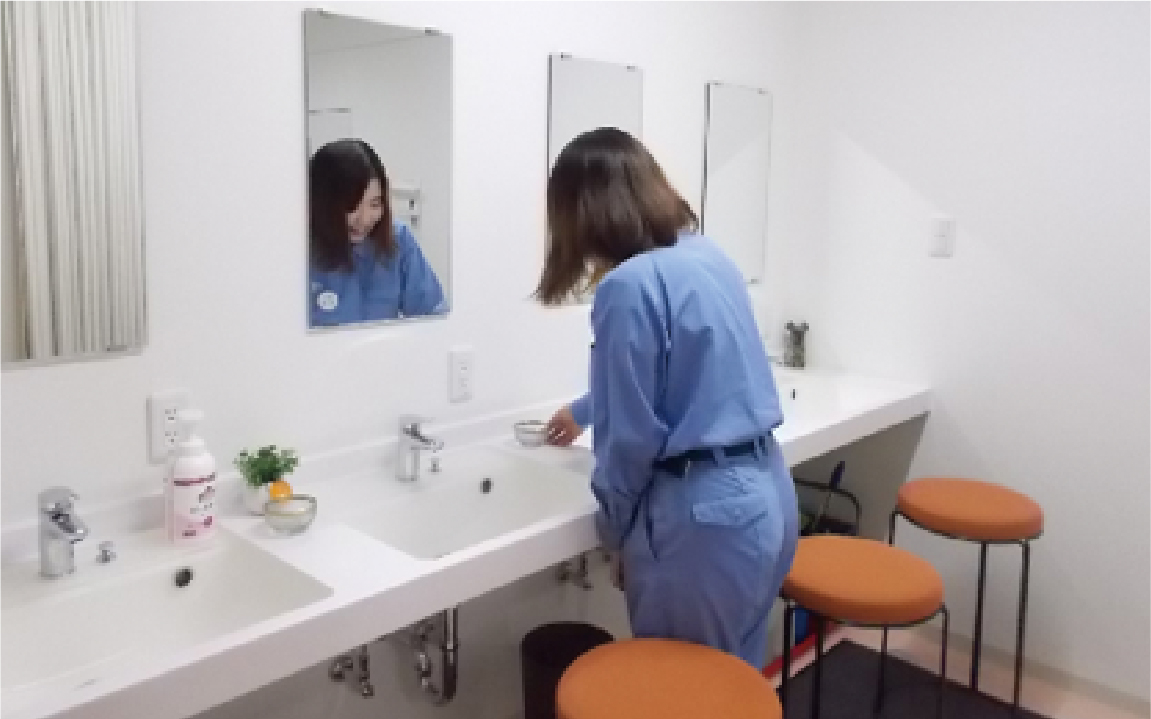
Powder room for exclusive use by female employees
Retirement age raised to 65
Our company has introduced a reemployment system that, as a general rule, allows all employees who wish to be employed until age 65. Additionally, we have reviewed our entire personnel system, including the abolition of the seniority-based qualification framework—we have transitioned to a new consistent personnel system that spans from entry to age 65 and better reflects employees’ efforts and performance.
Employment of people with disabilities
By creating workplaces where each employee can utilize their diverse capabilities and building frameworks to develop connections with society, we are contributing to the realization of a sustainable society where everyone can thrive.
To promote the advancement of people with disabilities, our Kawasaki Plant provides employees with disabilities with a special office space where they can work in comfort, as well as dedicated support personnel, giving due consideration to their individual characteristics and needs. If it is judged that an employee can perform standard work with guidance from support personnel, they can become a full-time employee in one of the Company’s workplaces. One employee with a disability became a full-time employee in FY2025. If an employee with a disability cannot become a full-time employee but it is judged that they can work consistently over a long period of time, they can transition to a permanent position. (Two employees with disabilities transitioned to a permanent position in FY2025.)
By providing work suited to employees’ individual characteristics, this framework draws out the motivation and skills of employees with disabilities and gives them a sense of accomplishment. Support staff and specialized personnel provide extensive support on a daily basis to enable occupational independence and ongoing employment.
We will continue promoting the creation of environments where people with disabilities can work long-term with peace of mind and endeavoring to foster a corporate culture that respects diversity.
Human Resource Development
Nippon Yakin Kogyo Group’s products are made possible by the experience and technology that our employees have developed over the years. To facilitate further growth of the Group, we have established a Human Resource Development Policy and are working to ensure that diverse employees can thrive.
Career-track employees: Collective training
To develop employees who will be core personnel in future, we consider new graduates’ first three years at the Company to be a time for building the foundations and their fourth and fifth years a time to move to new levels. Rank-based training is provided so that employees can start from the basics and then make qualitative and quantitative improvements.
Career-track employees and production operators: one-on-one meeting system
From FY2024, we have introduced a one-on-one meeting system to foster active communication and facilitate human resource development tailored to each employee’s characteristics. One-on-one meetings are held regularly and provide employees with the opportunity to ask questions about minor matters in their work and hear about potential directions their career could take and the Company’s expectations of them, which encourages autonomous growth by each employee.
Career-track employees and administrative employees:E-learning
We have introduced online video training to reduce the time and location constraints of traditional group training, thereby creating a learning environment where employees can have daily learning opportunities. Additionally, this system allows each individual to freely select and learn content tailored to their specific work challenges.
Career-track employees: Financial support for capacity building
To encourage autonomous skill development, we have introduced a system to subsidize the cost of courses in areas such as management, leadership, and language skills, financial skills, accounting knowledge, and IT literacy, regardless of whether it is directly necessary in an employee’s job.
Production operators:Training of new employees and skill succession
Upon joining the Company, new employees receive three months of collective training to learn the basics and gain qualifications. Employees then receive one-on-one education from experienced employees as OJT from the end of their threemonth collective training to the end of their second year so that they can promptly acquire the necessary skills. We also recommend technical certification exams and provide safety education using VR.
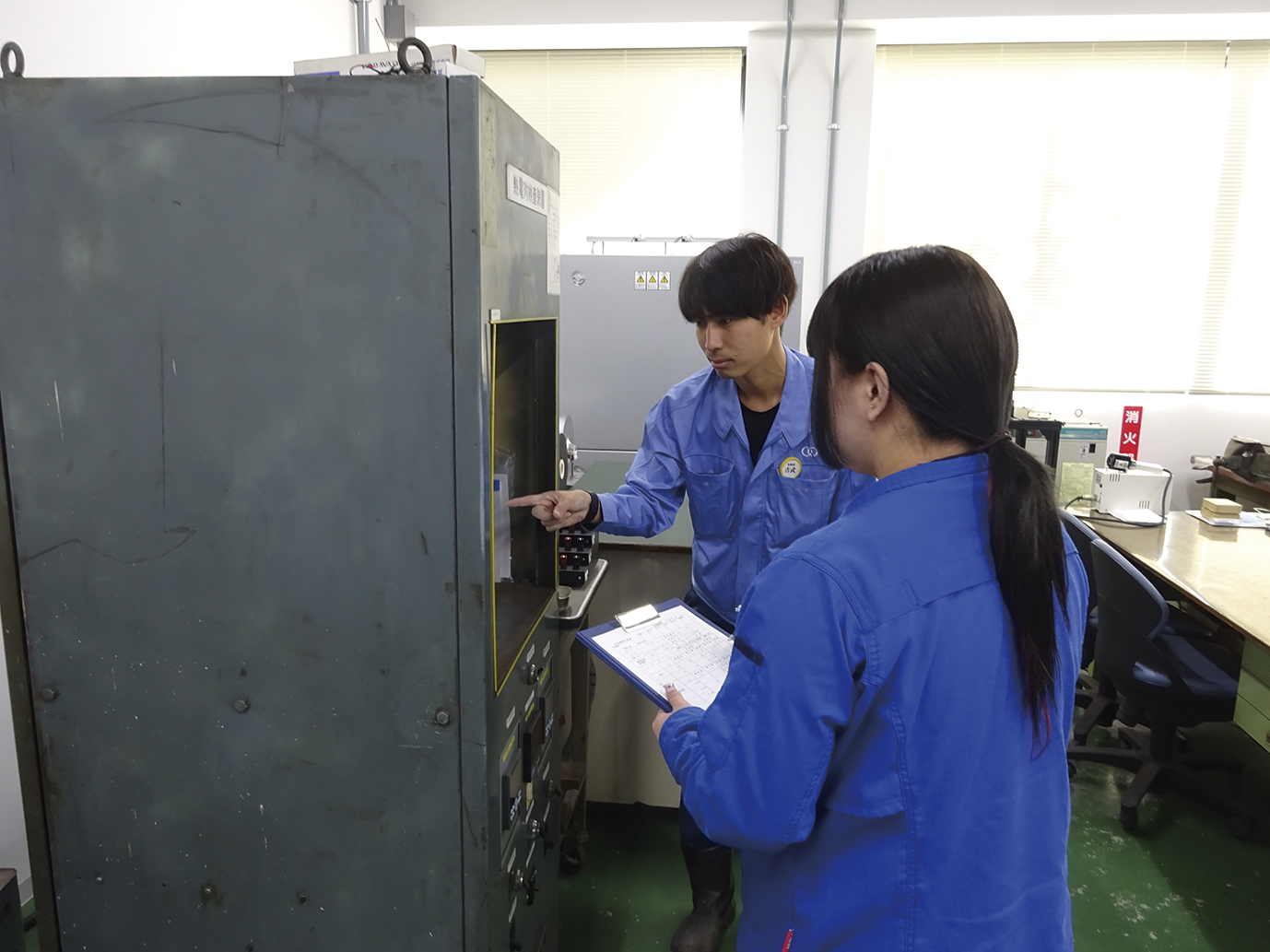
During each employee’s first two years at the Company, an experienced employee provides one-on-one instruction and training to support the employee in their on-the-job training.
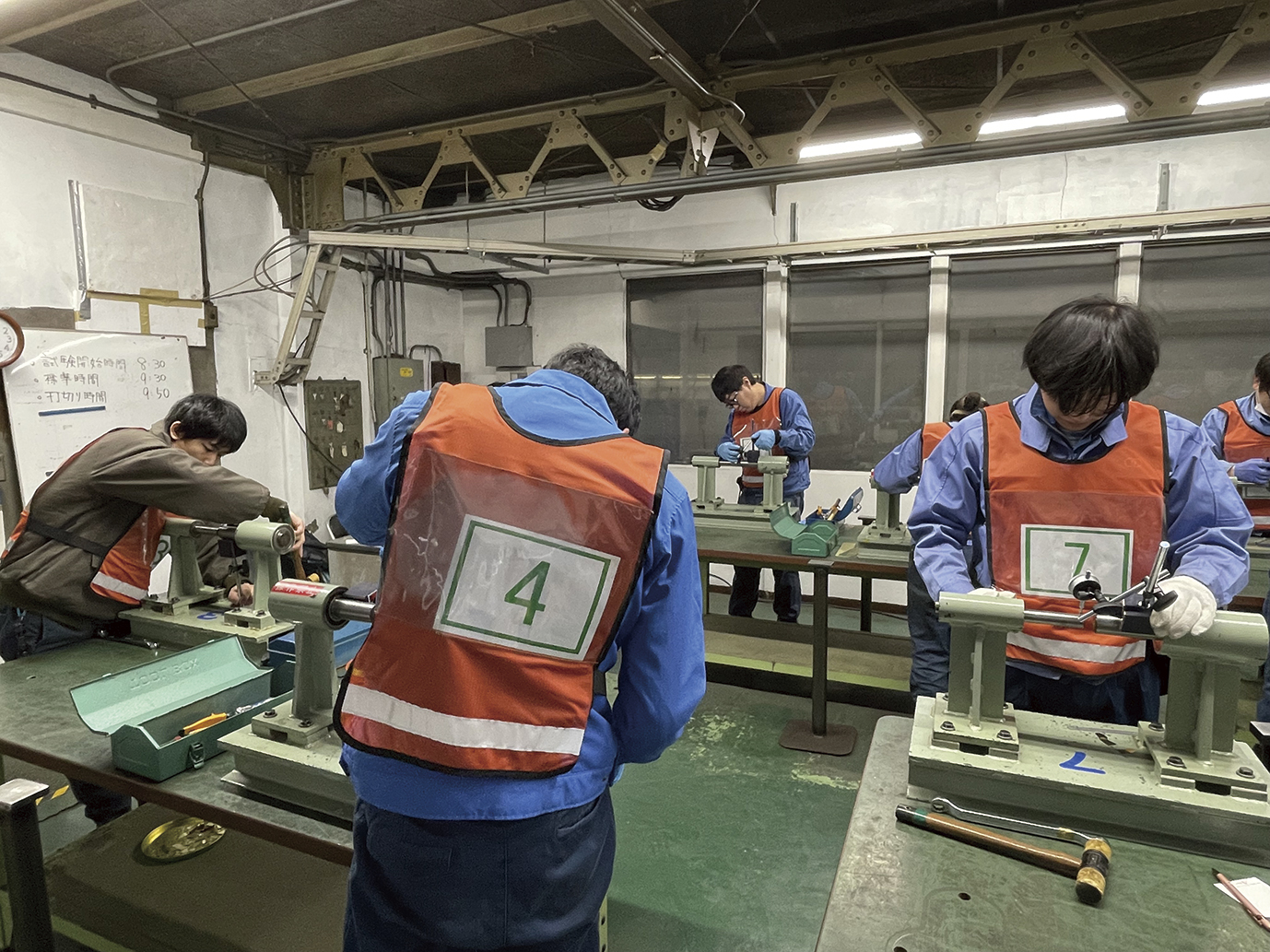
Employees can acquire some government technical certification in-house.
Production operators:Program for studying at the College of Industrial Technology
We have a program allowing employees who have graduated high school or are equivalently skilled to study at the College of Industrial Technology to receive a specialized technical education and become technical employees with both an academic and professional insights. After studying at the College of Industrial Technology for two years, we expect to see these employees in a wider range of career-track roles.
Measures for Work-Life Balance
We are implementing measures to help employees maintain a work-life balance so that they can perform their duties and achieve job satisfaction while also spending time outside the workplace meeting family responsibilities, participating in their local communities and pursuing personal goals, thereby leading a healthy and fulfilling life.
Results concerning the major systems and initiatives
Results concerning the major systems and initiatives
Mental health measures
To help each employee to keep working in good physical and mental health, we are implementing measures to help them ward off mental illness and detect any issues at an early stage. We conduct a stress check test of employees every fall and annually provide employees in charge of occupational safety and health at each of our workplaces with mental health training.
Stakeholder Engagement
Communication with local communities: social contribution activities
Nippon Yakin Kogyo, under the leadership of Kawasaki and Oheyama Plants and in cooperation with the related Group companies, communicates with local residents to help them deepen their understanding of the Company and to contribute to the creation of a safe and comfortable living environment and the revitalization of local communities.
Kawasaki Plant
Inari festival
The Plant has an Inari shrine on the premises where we hold a festival every year on November 3. We invite local residents to attend the festival, at which we pray for the safe operation of the Plant and for the safety of the local area and also dedicate a dance to the god of the shrine.
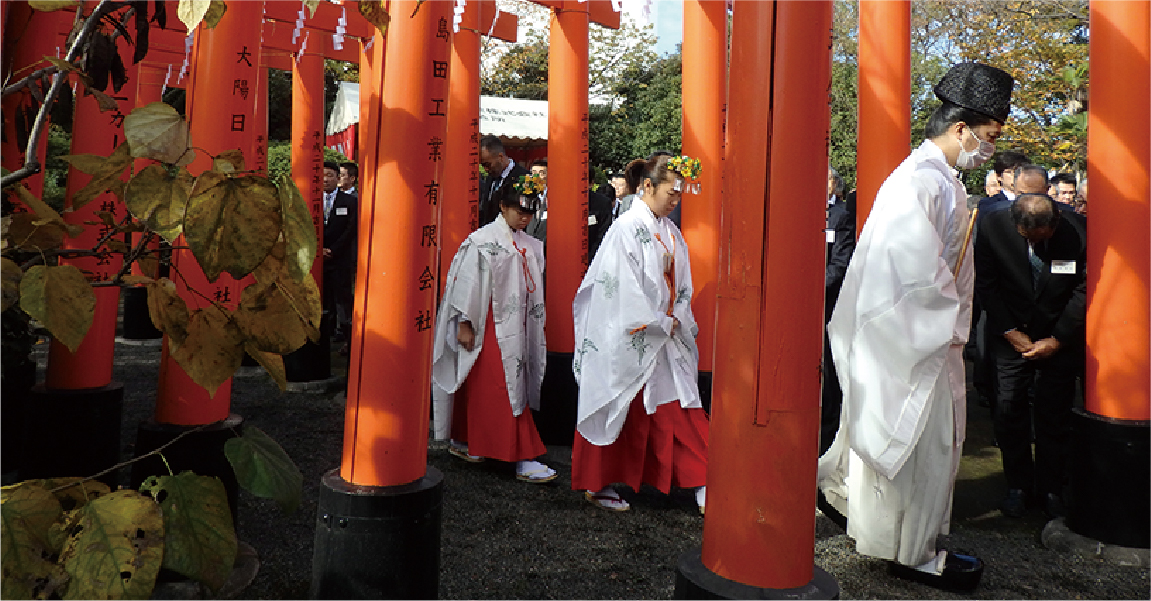
Summer festival
Together with the labor union, Nippon Yakin Kogyo annually holds a summer festival to reward employees for their efforts and to promote exchange with the local residents’ associations and others related to the company.
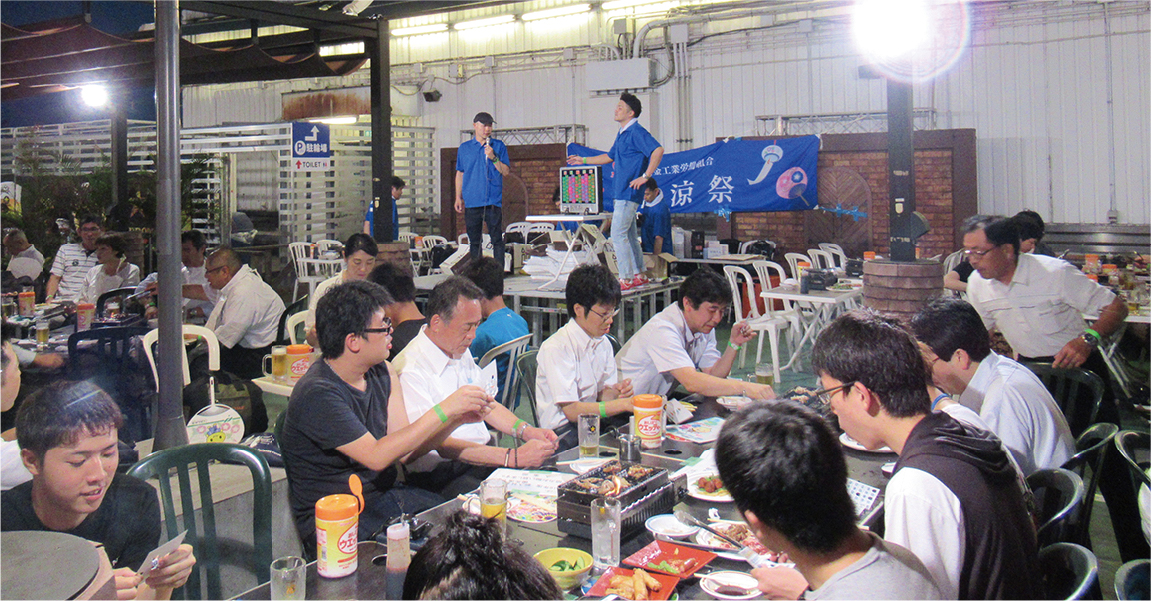
Clean-ups of nearby roads
Employees of Kawasaki Plant conduct a clean-up activity on the sidewalks of the Itsukushima Bridge [overpass] and Tonomachi Yakosen near the Plant twice a month.
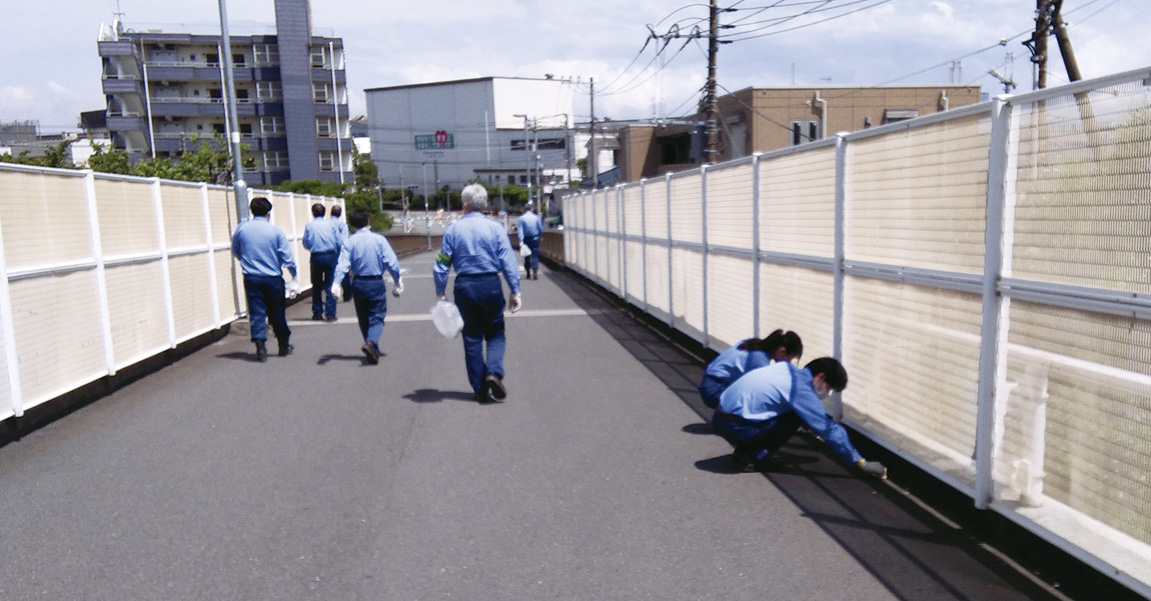
Involved in Kawasaki City 100th Anniversary Commemorative Project National Urban Greening Kawasaki Fair
2024 marked the centennial anniversary of Kawasaki City. To celebrate this milestone and highlight greening of cities around Japan in 2024 and 2025, the city held the Kawasaki City 100th Anniversary Commemorative Project National Urban Greening Kawasaki Fair. Our Kawasaki Plant was a part of the fair’s Executive Committee, as well as being a Silver Sponsor.


Involved in community sports events by neighborhood associations
Our Kawasaki Plant is involved in friendly sports events organized by neighborhood associations (simplified volleyball matches between neighborhood associations and local companies). Plant personnel are working to foster closer ties with members of the community and other local companies through sports and, in doing so, invigorate communities.
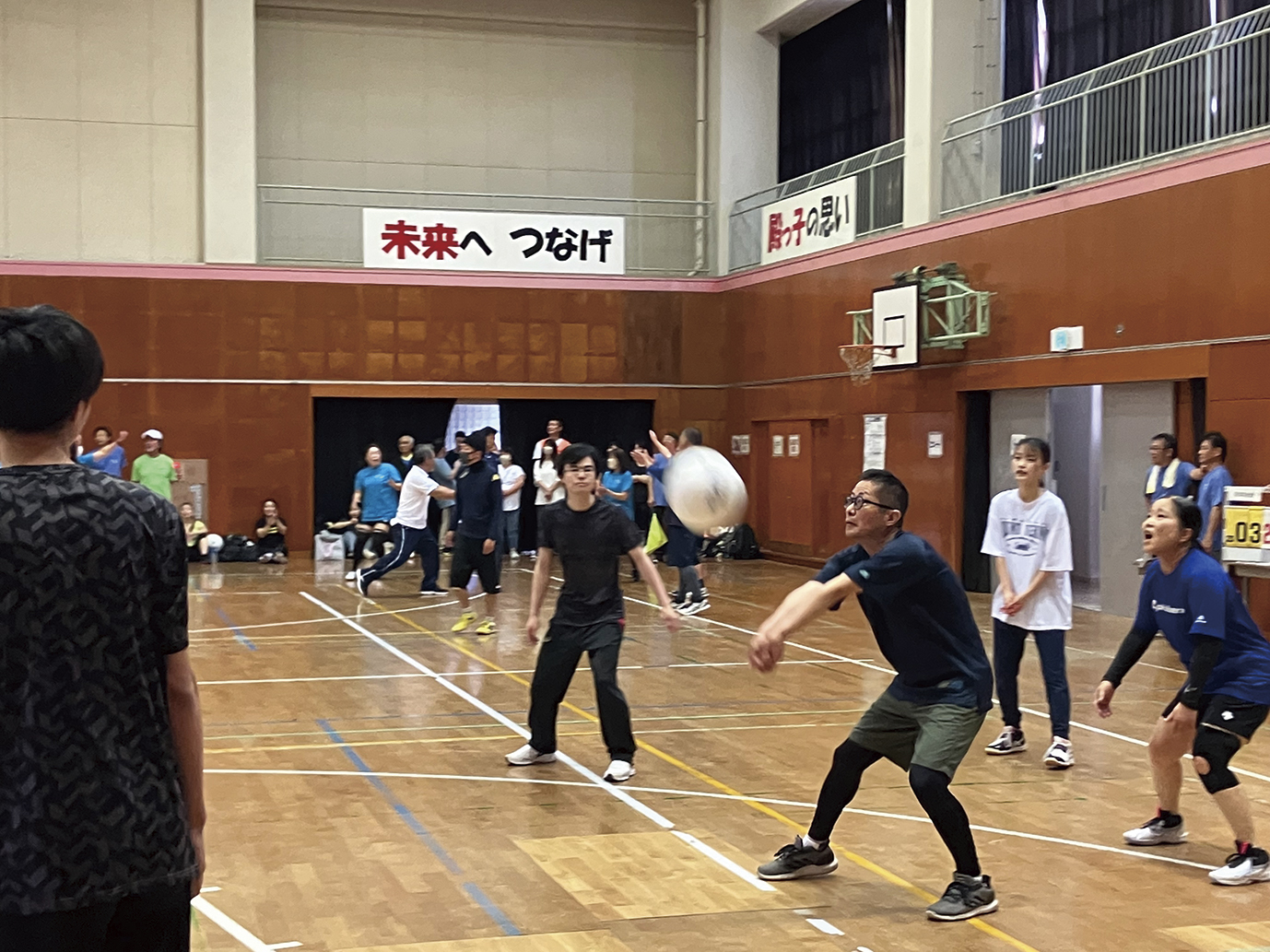
Traffic safety initiatives in the nearby community
Our Kawasaki Plant is a member of the Kawasaki Portside Driving Safety Management Association, which comprises various businesses within the local police district, and is actively involved in traffic safety activities for both the Company and the wider community, including giving instructions in the street and organizing accident prevention and awareness-raising competitions. In 2024, the Plant received an award for its many years of driving safety management and contributions to the community.

Involvement with Kawasaki points-based health project (Kawasaki TEKTEK)
Our Kawasaki Plant is involved with a health project using a walking app created by the Kawasaki City government. In addition to raising employees’ own health awareness through the app, the points are donated to schools to improve the children’s experience, creating a cycle of health and kindness in the community.
Oheyama Plant
Plant tours
Our Oheyama Plant offers tours for business partners and families of employees, as well as factory tours for students at
local elementary, junior high, and high schools.
These tours foster a greater understanding of the plant’s business among members of the community and make the plant a
more familiar presence.
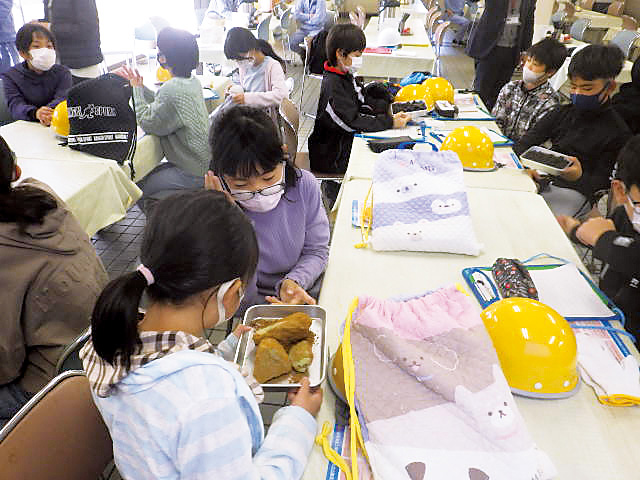
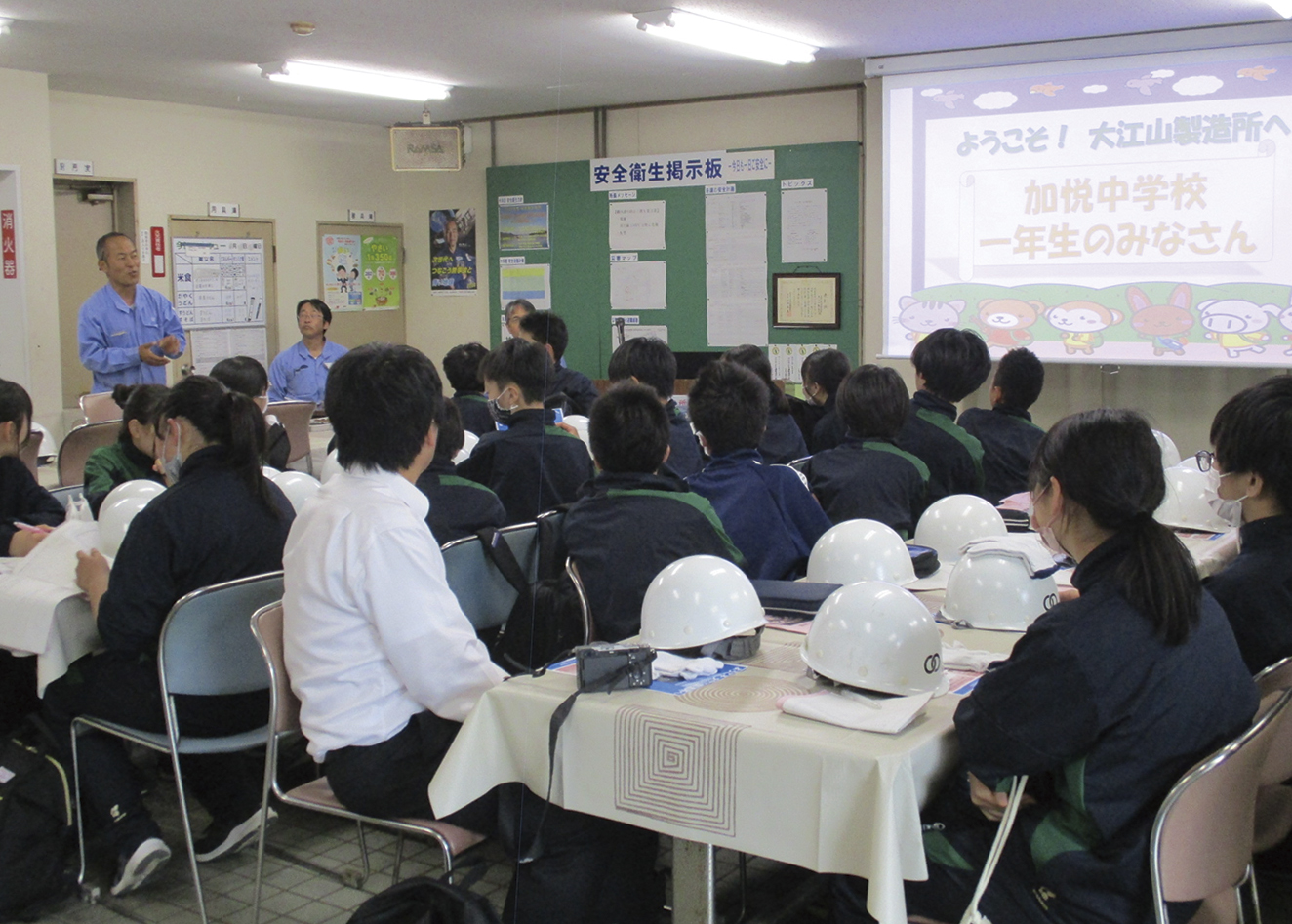
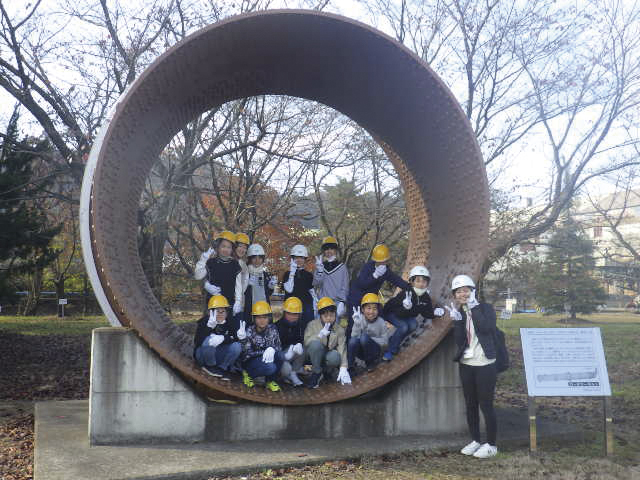
Clean-up activity for the Amanohashidate sandbar
We participate in clean-up activities of the Amanohashidate sandbar, which is regarded as one of Japan’s three most scenic views, every spring and fall for the beautification and protection of the scenic beauty. This time around 70 people participated in the acivities collaborating with local youth baseball team.
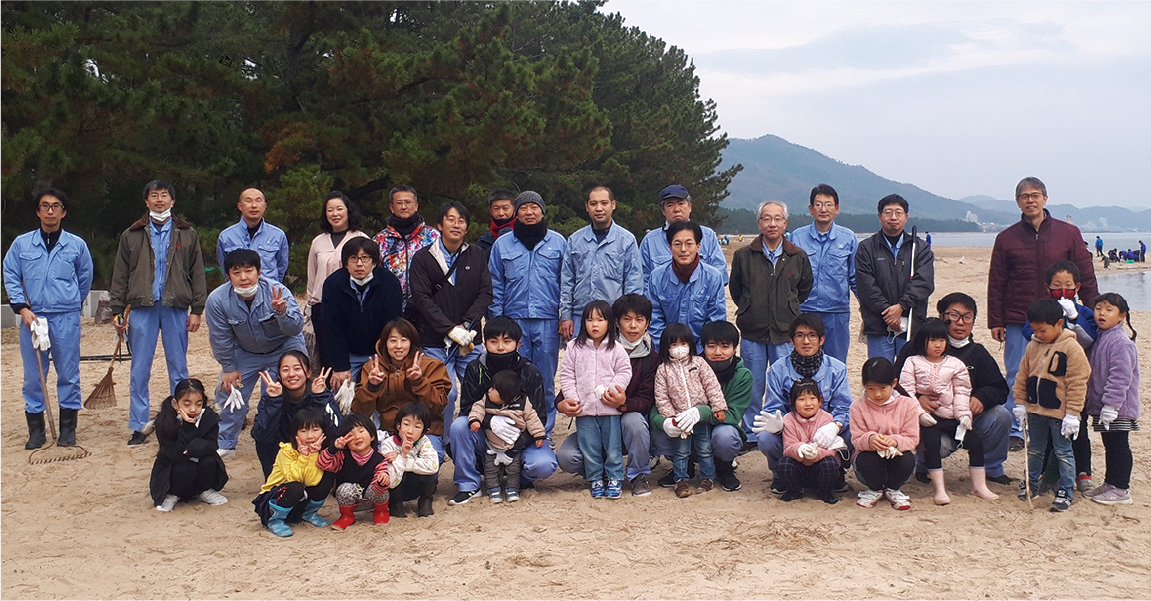
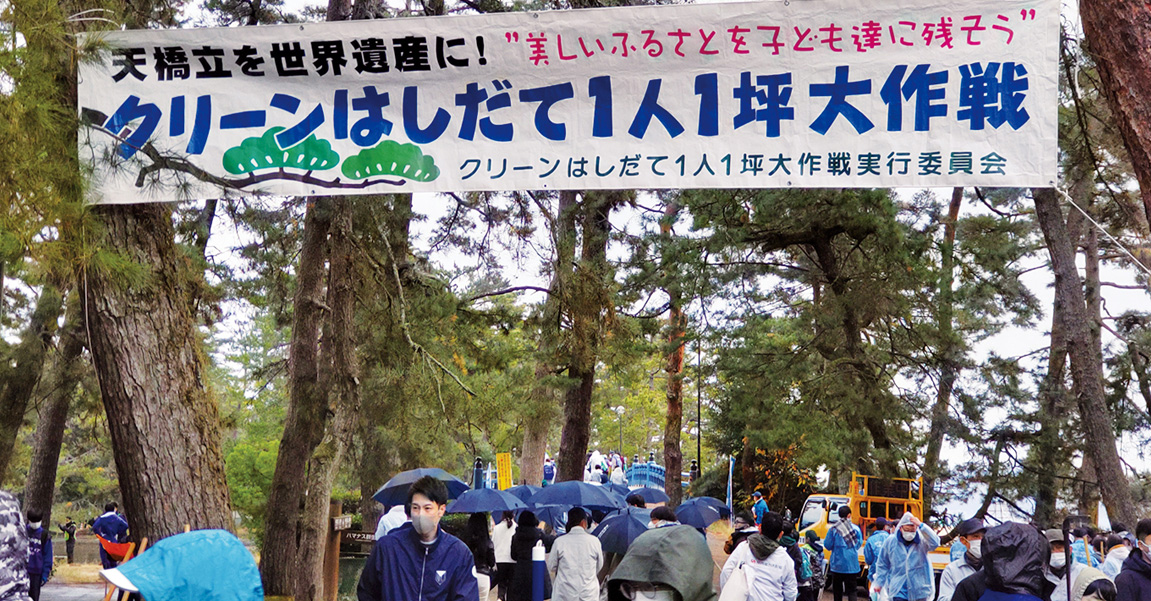
Collaboration with Miyazu City, designated by the Japanese government as an SDGs Future City*
From FY2025, the Company has been working together with Miyazu City, where our Oheyama Plant is located, on an initiative to turn used hand warmers into a new resource.
With the help of our community members who collect used hand warmers, we are repurposing the hand warmers as ferronickel resources, and, in doing so, contributing to a
reduction of trash in Miyazu City.
* SDGs Future Cities are selected by the Cabinet Office from cities and other communities that are working on fundamental, comprehensive initiatives in line with the principles of the SDGs. Cities and communities that receive this designation are those with particularly high potential to realize sustainable development through the creation of new economic, social, and environmental value. 207 local governments were selected between FY2019 and FY2025.
Communication with shareholders and investors
To further increase the Company’s corporate value, we disclose information appropriately to shareholders and investors as and when necessary and are working to further
enhance our disclosures. At our twice-yearly briefing sessions about our financial results, we facilitate exchanges of opinion about our financial results and management plans and speak one-on-one with institutional investors (62 dialogues with 65 parties in FY2024→60 dialogues with 76 parties in FY2025).
Feedback we receive is shared with our management team and relevant internal divisions and relayed to our Board of Directors through our Corporate Communication
Committee, which is overseen by the director in charge of the Investor Relations and Public Relations Department. We also held tours of our Kawasaki Plant for individual and
institutional investors in FY2025, like in FY2024, where we showed them our equipment, such as our new cold rolling mill, and explained our business strategies.

Communication with customers
As we are required to supply products that meet the needs of our customers, we aim to continuously earn their trust by providing the industry’s top-level products and services in terms of quality, due dates, cost, and technologies and solutions in order to be a sustainable company.
Our products have a significant effect on the quality and performance of the final products made by customers. Accordingly, it is essential for us to communicate appropriately with our customers at the consulting stage, before we receive orders from them, and subsequently, including at the manufacturing, delivery and follow-up stages. While responding to changes in the market environment including the trends for globalization and carbon neutrality, we are sincerely working to meet our customers’ requests from a long-term viewpoint.
For the provision of solutions, we are fostering communication with customers mainly through the Material Solutions Sales Department. We offer advice on product selection based on sample testing and property confirmation, guidance on processing and welding methods, and proposals that utilize our database and technical knowledge. Moreover, we closely cooperate with our customers for product improvements and the development of new products, thereby building even stronger relationships with them.
Communication with labor union
The Company holds “Labor-Management Roundtable Meetings” for management and labor union to exchange opinions on
management conditions, the labor environment, and other issues.
The dialogues between management and the labor union helps to build cooperative labor-management relations.
Procurement
With regard to the procurement of mineral resources, the risks of conflict, human rights violations, and environmental destruction are being taken seriously internationally. There is a call for companies to carry out human rights due diligence throughout their supply chains and appropriately address ESG risks. To meet these social needs, we are paying attention to movements in government policy and industries in various countries and working together with various departments to strengthen our initiatives for responsible procurement of minerals. We will continue building a highly transparent procurement framework and contributing to the realization of a sustainable society.
 An ore yard at our Oheyama Plant
An ore yard at our Oheyama Plant
Management of conflict minerals
We have established the Conflict Minerals Management Rules (hereinafter, “the Rules”) for the management of so-called Conflict Minerals (i.e., gold, tin, tantalum, tungsten, and other minerals themselves, or alloying materials containing such minerals). Under the Rules, we do not procure from the Democratic Republic of the Congo, surrounding countries, or other conflict zones or high-risk areas. Information is gathered from our raw material suppliers through the vendors we deal with, and is stored for seven years. The Export Trade Control Committee manages the Company’s responses to these matters, the effectiveness of which are also examined through internal auditing. The details of the committee’s discussions are also reported at Management Meetings.
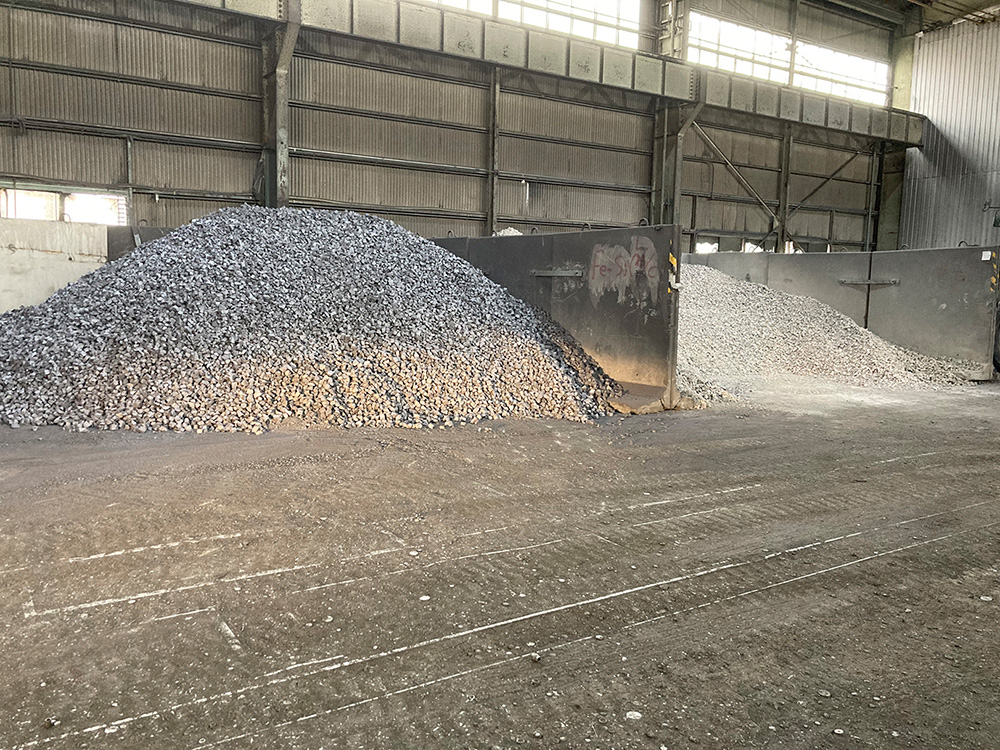 Indoor iron alloy warehouse, Kawasaki Plant
Indoor iron alloy warehouse, Kawasaki Plant
Human rights due diligence, etc. across the supply chain
In April 2024, we announced the Nippon Yakin Kogyo Group Human Rights Policy, and we have begun investigating human rights risks associated with materials such as our primary minerals. We also established the Nippon Yakin Kogyo Sustainable Procurement Guidelines in July 2025 to realize sustainable procurement environments throughout our supply chain. We are also carrying out appropriate efforts with our suppliers on an ongoing basis.
In October 2023, we announced a policy not to accept scrap metal from “illegitimate yards”, which could impact local communities’ quality of life through harm such as noise, vibration and water pollution. We also asked our business partners to thoroughly manage the operations of parties such as their suppliers to ensure compliance, in an effort to uphold our responsibilities to local communities and the environment.
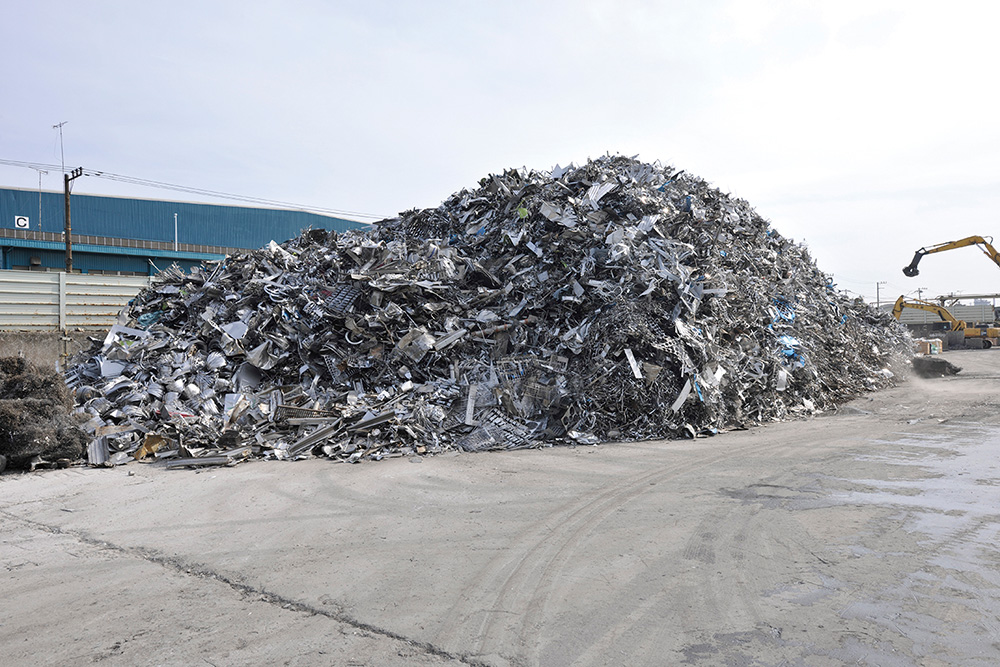 Scrapyard at Kawasaki Plant
Scrapyard at Kawasaki Plant
Response to environmental issues, etc. in procurement supply chain
In recent years, there have been cases of “illegitimate yards”, which store or work with illegal scrap metal and impact local communities’ quality of life through harm such as noise, vibration and water pollution. These are becoming a major social issue. In October 2023, to facilitate more stringent compliance with laws and regulations, including at supplier sites, we announced a policy that scrap metal from “illegitimate yards” must not be accepted, and asked our business partners to thoroughly manage the operations of parties such as their suppliers to ensure compliance.
Response to the 2024 Problem in Japan’s logistics
To ensure reliable and sustainable logistics, we are working together with business partners and logistics companies
according to the Japan Iron and Steel Federation’s Voluntary Action Plans toward Optimization and Productivity
Improvement in Logistics on measures such as shortening cargo wait times and loading times, improving the efficiency of
transportation, and revising and clarifying the terms of contracts to further strengthen our relationships with these
companies.
The Company agrees to the promotion of “white logistics” and has submitted a Voluntary Action Declaration.
Declaration of Partnership Building
Nippon Yakin Kogyo has agreed to the statements by the Council on Promoting Partnership Building for Cultivating the Future, comprising the Chairman of the Japanese Business Federation, the Chairman of the Japan Chamber of Commerce and Industry, the President of the Japanese Trade Union Confederation and relevant ministers (Cabinet Office, Ministry of Economy, Trade and Industry, Ministry of Health, Labour and Welfare, Ministry of Agriculture, Forestry and Fisheries, Ministry of Land, Infrastructure, Transport and Tourism), and announced its own Declaration of Partnership Building in June 2022.
To build new partnerships with the business partners in our supply chain, we will form alliances beyond factors such as our existing business relationships and the scale of our business with the aim of achieving mutual prosperity for Nippon Yakin Kogyo and its business partners. These partnerships will also include support such as business continuity assistance in cases such as disasters and advice from the perspective of work practice reforms.
We also uphold suitable practices for trading with subcontractors (Development Standards based on the Act on the Promotion of Subcontracting Small and Medium-sized Enterprises), actively and continuously work to correct trade and business practices that prevent the building of partnerships with business partners, and work to build a sustainable society under our management philosophy of “We promote the well-being of all who join with us”.